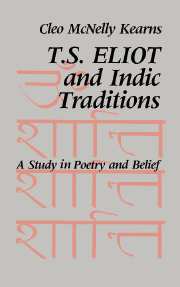7 - Metaphysics in The Waste Land
Published online by Cambridge University Press: 07 October 2011
Summary
The intense feeling, ecstatic or terrible, without an object or exceeding its object, is something which every person of sensibility has known …
T. S. EliotIt is the feeling of the incompleteness of the actual that is the rent in the rock through which the lifegiving waters flow.
S. RadhakrishnanTHOUGH AT POINTS it anticipates Eliot's later “wisdom” mode, The Waste Land is primarily a metaphysical poem in both the literary and the philosophical senses of the term. It proceeds largely by ingenious, sometimes violent conceits of style and syntax, each designed not so much to convey an argument as to convert, as Eliot put it, “thought into feeling and feeling into thought” (CL 8). Thematically, it draws on extremely disparate points of view and juxtaposes them less for their rational coherence than for their registration on the sensibility. Here metaphysical ideas, torn from their matrices in whole systems of thought and culture, are “maintained in suspension” and placed against one another, as in Donne, to be “matter for inspection” rather than “matter for argument” (SW 162). Here too is that confrontation with “jarring and incompatible” worlds (KE 147) in these fragments, and in general between knowledge and experience, real and ideal, self and other, that Eliot, with Bradley, saw as greeting any attempt at consistent and unified philosophical thought.1
Like many metaphysical poems, The Waste Land is also in part a mimesis of the process of the mind in the early stages of meditation.
- Type
- Chapter
- Information
- T. S. Eliot and Indic TraditionsA Study in Poetry and Belief, pp. 195 - 229Publisher: Cambridge University PressPrint publication year: 1987



